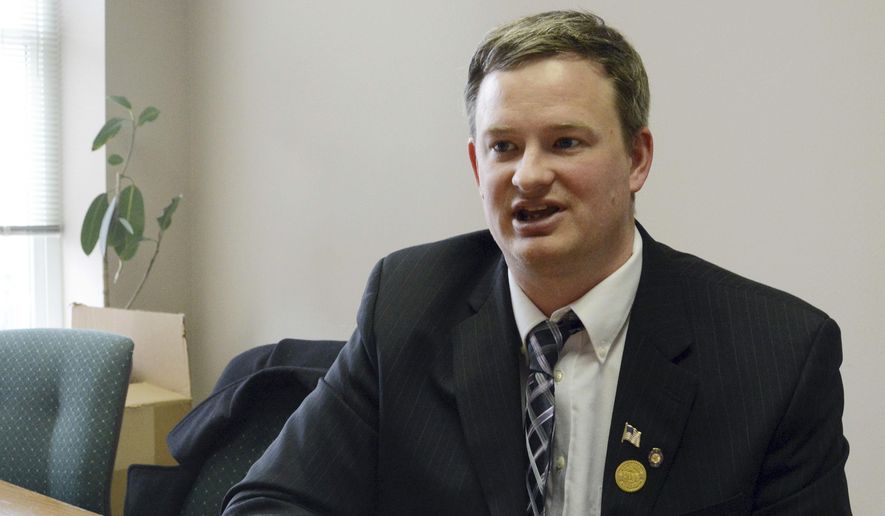PIERRE, S.D. (AP) - Gov. Kristi Noem’s administration is projecting that a measure to reverse South Dakota’s presumptive probation policy could spur an influx of prisoners, potentially costing the state millions of dollars each year and requiring at least $33.3 million for new prison facilities.
Opposition from the governor’s finance agency and the Corrections Department during a Tuesday bill hearing put Noem’s administration at odds with Attorney General Jason Ravnsborg over the cornerstone of his legislative agenda. Noem and Ravnsborg both took office last month.
The presumptive probation law requires judges to sentence people who have committed certain nonviolent, lower-level felonies - including drug possession and use - to probation rather than prison, unless there’s a “significant risk” to the public. It’s credited with helping avert expensive prison population growth, but critics say it ties judges’ hands.
Ravnsborg told lawmakers on the Senate Judiciary Committee that the measure seeks to give law enforcement, prosecutors and judges their “discretion back.” It’s part of a platform that’s also focused on prevention, rehabilitation and bolstering work programs.
“I would ask that you give me the tools to keep South Dakota safe and tackle the meth problem we all know is present is in our state,” Ravnsborg said.
Law enforcement representatives also backed the change, which is expected to get a committee vote on Thursday. Supporters of ending presumptive probation argue it’s driven up county jail budgets across the state as courts send offenders there rather than prison.
“We’ve pushed the cost from the state down to the county, so the taxpayers are already paying the burden, they’re just paying it in a different way,” Ravnsborg said.
But Department of Corrections official Laurie Feiler said the bill would add significantly to the number of inmates in the state prison system for drug possession and require “substantial” additional funding for correctional staffing, operations and building construction.
Noem’s administration is projecting the measure could add operating costs ranging from more than $8.7 million to $35 million annually, depending on the number of presumptive probation offenders who would instead get sent to prison. Building costs to house the additional inmates could range from $33.3 million to $150 million, according to the analysis.
“I do urge a no vote on this bill because of the significant increase needed in the Department of Corrections’ already lean budget,” said Brittni Skipper of the Bureau of Finance and Management.
The officials’ testimony gives a window into Noem’s views on the bill. Noem said last month that presumptive probation has been described to her as frustrating, but she doesn’t want to be in the “business of building new prisons and jails.”
Local chapters of the ACLU and Americans for Prosperity also opposed the bill. ACLU of South Dakota policy director Libby Skarin said South Dakota should preserve presumptive probation because it presents an alternative to incarceration that helps families stay together. She said it gives offenders the ability to work and provide for their children and get treatment rather than sit in prison cells.
“I would love to see bills that would enhance prevention and that would focus on treatment,” Skarin said. “So let’s start with that and not with doubling down on enforcement.”
Supporters of presumptive probation contend courts have enough discretion now: Judges can deviate from probation if they find aggravating circumstances that pose a major risk to the public. Judges sent 20 percent of people eligible for presumptive probation directly to the penitentiary in the 2018 budget year, according to a state report.
Presumptive probation was part of a 2013 Republican-led justice overhaul to tackle prison overcrowding, cut costs and expand drug addiction treatment options.
Officials said at the time of the overhaul that if nothing was done to curb the rapid increase of inmates, the state would have to spend more than $200 million to build and operate new prisons over the following decade. Former Republican Gov. Dennis Daugaard was among those who championed the package.
A 2016 report from the Urban Institute found presumptive probation and other changes played a major role in avoiding growth in the state prison population, and the latest state analysis credits the overhaul with saving taxpayers about $28 million.
The committee couldn’t vote on the bill Tuesday morning because a legislative prison and jail population cost estimate wasn’t available. Ravnsborg said that’s “extremely frustrating” because the bill was filed before the session began.




Please read our comment policy before commenting.